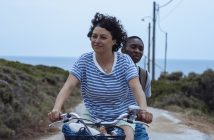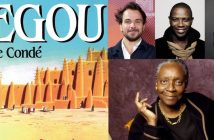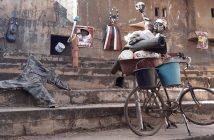A well-known documentary maker who has never set foot in Africa decides to go there to understand what is happening and what happened in Rwanda. He goes there ten years after the Genocide, ready to listen. His first stop is in Germany where he meets Esther, a survivor. Shot from the train, images of a flooded countryside set the tone: reality goes beyond fiction.
First difficulty: the silence. We saw the catastrophe coming but we did not talk about it. Everyone sang a popular song, as if it were nothing: « Let’s exterminate them ». In the little Rwandan bus, Gheerbrant notes the « benevolent indifference from those passengers with whom we share nothing ». This issue of difference will quickly become central. How do you broach the subject of an unknown reality? Human relations are essential. As Burundian film-maker Joseph Bitamba did in Jacqueline, mère des orphelins (Jacqueline, mother to the orphans), Gheerbrant pays a visit to this orphanage opened by a woman who, through it, gives a meaning to her life ruined by the genocide. It is not that simple to find your place when you have a camera in your hands and that you are white. The encounter with Deo turns out to be a turning-point: he becomes the guide and the facilitator, the translator and the peaceful and disturbing actor. It calls to mind the relation between Jean Rouch and Damouré Zika: come in 1941 to Niger as a civil engineer, when his car broke down, he had to go down the Niger in a pirogue, accompanied by his translator later became his favourite actor
Deo also takes care of orphans and uses dancing as a therapy. The infinite gracefulness of the bodies sublimates the tragedy in their heads.
And for us, there is a nagging question that Gheerbrant seems to raise focusing on these dances: how is it possible that a people that dances so harmoniously slid into extreme horror? His film is a quest for understanding. The first third, as Gheerbrant ends his first trip, will be a turning-point: « I had tried to put our differences aside ». How do you find what creates solidarity? To create solidarity, « not only does one need to acknowledge there is a part of oneself in Others, but also that there is a part of Others in oneself », writes Claude Liauzu in Race et civilisation. Gheerbrant already knows that. It is part of his reasoning: being open, listening and sharing. But it’s this missing part that comes bouncing back at him and makes the film interesting: the alienability of Others. By painfully experiencing it, Gheerbrant not only invites us to realize what we have in common with foreigners that reassures us but also what cannot be integrated, these cultural elements that Others can use to hold on to their difference and shake up our certainties.
How does one proceed? In a country whose History weighs so much, memory is the solution. The film explains. It doesn’t have the choice: like in the first work in progress of the Rwanda 94 show in which Jacques Delcuvellerie sat at a table in the middle of the stage with a jug and a glass of water and talked for 45 minutes about the historical mistakes made about the Hutus and the Tutsis, Gheerbrant has his say through a voice-over, without trying to lecture of course but still with the necessary details. One cannot remain superficial when it is these simplisms that cultivated hatred.
Today, memory is called justice, a terrible test that Rwanda is trying to manage with the gacacas (pronounced « gachachas », sort of popular courts where people are encouraged to speak). The 120000 prisoners all say the same thing, just like the Germans who succumbed to Nazism. Propaganda was what stopped them from seeing the human beings. But that required integrating an illusory yet deeply schizophrenic threat: racism plays on our hidden fears that we project onto another who is politically identified. « What I know now, concludes Gheerbrant, is that by trying to eliminate the Others in their midst, it is a whole people that the upholders of hatred have destroyed ». This conclusion is essential: it shows that racism is also deadly for those who put it into practice.
So the tragedy of the country of the thousand hills highly concerns us, not to mention that it blows up in our faces as Europe is at the origin of the hatred and has multiplied the mistakes. All of this, Gheerbrant tackles not from the point of view of a journalist but of a solitary artist, a globe-trotter of understanding, a human but also a film-maker who frames his subject with the right distance and respect, who takes the time to observe and does not hide from others, who invites us to share his hesitations and doubts because he knows, as Nietzsche used to say, that « doubt is not at the origin of folly, certainty is ». A real piece of film work.








